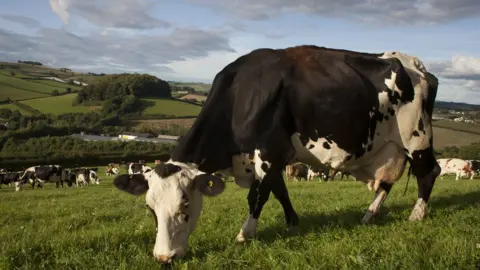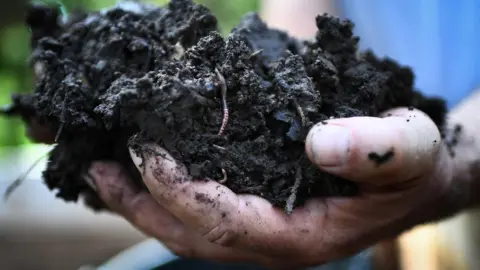Climate: 100% organic farming would boost emissions
 Getty Images
Getty ImagesA new study suggests that a switch to 100% organic food production in England and Wales would see an overall increase in greenhouse gas emissions.
While going fully organic would produce fewer direct emissions than conventional farming, researchers say it would limit food production.
As a result more imports would be needed, resulting in up to five times more land being used overseas.
Overall emissions could rise by 21% compared to the conventional approach.
Farming is generally estimated to be responsible for around 9% of overall UK greenhouse gas emissions, due to the use of artificial fertilisers, but also through emissions of methane from animals and from changes in soil conditions.
This new study aims to assess what the impact would be on greenhouse gases if all food production in England and Wales switched to organic.
Such a move, the researchers say would see a drop in emissions of about 20% for crops and around 4% for livestock.
However, the study predicts significant drops in food production, by around 40% compared to conventional farming.
The scientists involved say that decrease is due to smaller crop yields and the introduction of nitrogen-fixing legumes into crop rotations, reducing the amount of land available for production.
So crops like wheat and barley would see significant falls in production. For livestock, the numbers of sheep and beef cattle in the scenario would increase but the volume of meat would go down, due to lower carcase weights and longer finishing times under organic management.
 hobo_018
hobo_018To meet the demand for food, the study says the shortfall would have to be made up from imports. The researchers assume that a proportion of these imports would have to come from changing land use overseas.
Due to significantly lower productivity in other countries, this would require five times the amount of land that is currently used for food in England and Wales.
Converting grassland overseas to arable uses also reduces the amount of carbon stored in the soil. In the best case scenario, with the least amount of land change, then overall emissions are comparable to those under conventional agriculture. However, if half the land is changed from grassland, then overall emissions from UK food production would go up by 21%.
"We estimate that, were organic farming to be adopted wholesale without any change in diet, we would need nearly six million more hectares of land," said one of the authors, Philip Jones, from the University of Reading.
"Much of which would need to come from Europe. This has an associated impact on the environment, adding potentially unnecessary food miles and greenhouse gas emissions to our food systems."
 Getty Images
Getty ImagesThe authors acknowledge that there would be significant benefits for cleaner air and water and improved biodiversity under a fully organic farming future. But critics of the study have focused on the fact that it presumes that there will be no change in people's diets.
"The assumptions behind the study's conclusion that there will be a net increase in greenhouse gas emissions under organic are fundamentally flawed," said Rob Percival of the Soil Association.
"The study assumes no change in diet, which is clearly untenable given the global dietary health crisis, and that we would keep diverting most of our cropland to over-production of the wrong things - livestock feed, commodity crops for processed food and biofuels."
The researchers involved in the study responded to these criticisms by underlining the fact that that wasn't the goal of this piece of research.
"The assumption about diets is crucial: today's organic consumers are a self-selecting group and not typical of the nation," said co-author Dr Adrian Williams from Cranfield University.
"Whether a different national diet could be provided by the same land area under all organic production is a different study. This was aimed at understanding limits to production. The study was based on rigorous modelling that had its foundations in establishing the biophysical limits of crop production without manufactured nitrogen."
The research has been published in the journal Nature Communications.
